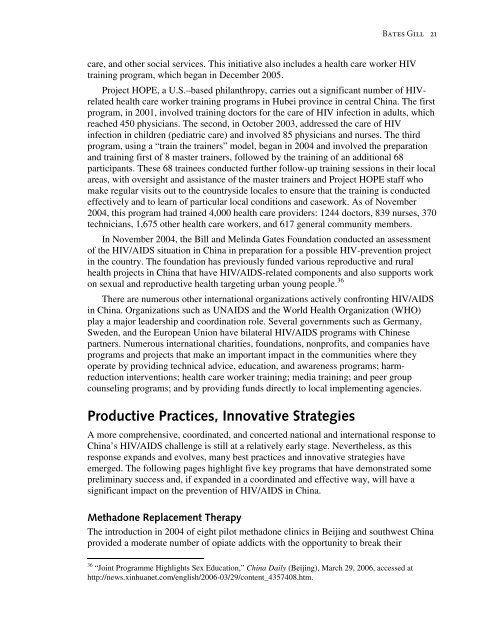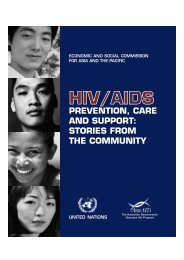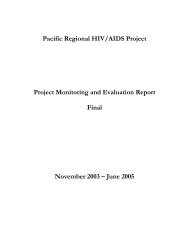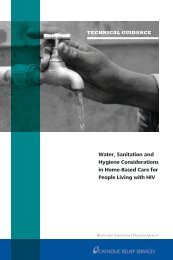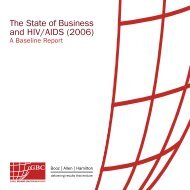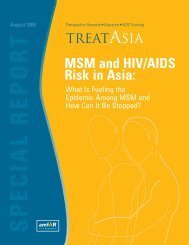Assessing HIV/AIDS Initiatives in China - Center for Strategic and ...
Assessing HIV/AIDS Initiatives in China - Center for Strategic and ...
Assessing HIV/AIDS Initiatives in China - Center for Strategic and ...
Create successful ePaper yourself
Turn your PDF publications into a flip-book with our unique Google optimized e-Paper software.
Bates Gill 21<br />
care, <strong>and</strong> other social services. This <strong>in</strong>itiative also <strong>in</strong>cludes a health care worker <strong>HIV</strong><br />
tra<strong>in</strong><strong>in</strong>g program, which began <strong>in</strong> December 2005.<br />
Project HOPE, a U.S.–based philanthropy, carries out a significant number of <strong>HIV</strong>related<br />
health care worker tra<strong>in</strong><strong>in</strong>g programs <strong>in</strong> Hubei prov<strong>in</strong>ce <strong>in</strong> central Ch<strong>in</strong>a. The first<br />
program, <strong>in</strong> 2001, <strong>in</strong>volved tra<strong>in</strong><strong>in</strong>g doctors <strong>for</strong> the care of <strong>HIV</strong> <strong>in</strong>fection <strong>in</strong> adults, which<br />
reached 450 physicians. The second, <strong>in</strong> October 2003, addressed the care of <strong>HIV</strong><br />
<strong>in</strong>fection <strong>in</strong> children (pediatric care) <strong>and</strong> <strong>in</strong>volved 85 physicians <strong>and</strong> nurses. The third<br />
program, us<strong>in</strong>g a “tra<strong>in</strong> the tra<strong>in</strong>ers” model, began <strong>in</strong> 2004 <strong>and</strong> <strong>in</strong>volved the preparation<br />
<strong>and</strong> tra<strong>in</strong><strong>in</strong>g first of 8 master tra<strong>in</strong>ers, followed by the tra<strong>in</strong><strong>in</strong>g of an additional 68<br />
participants. These 68 tra<strong>in</strong>ees conducted further follow-up tra<strong>in</strong><strong>in</strong>g sessions <strong>in</strong> their local<br />
areas, with oversight <strong>and</strong> assistance of the master tra<strong>in</strong>ers <strong>and</strong> Project HOPE staff who<br />
make regular visits out to the countryside locales to ensure that the tra<strong>in</strong><strong>in</strong>g is conducted<br />
effectively <strong>and</strong> to learn of particular local conditions <strong>and</strong> casework. As of November<br />
2004, this program had tra<strong>in</strong>ed 4,000 health care providers: 1244 doctors, 839 nurses, 370<br />
technicians, 1,675 other health care workers, <strong>and</strong> 617 general community members.<br />
In November 2004, the Bill <strong>and</strong> Mel<strong>in</strong>da Gates Foundation conducted an assessment<br />
of the <strong>HIV</strong>/<strong>AIDS</strong> situation <strong>in</strong> Ch<strong>in</strong>a <strong>in</strong> preparation <strong>for</strong> a possible <strong>HIV</strong>-prevention project<br />
<strong>in</strong> the country. The foundation has previously funded various reproductive <strong>and</strong> rural<br />
health projects <strong>in</strong> Ch<strong>in</strong>a that have <strong>HIV</strong>/<strong>AIDS</strong>-related components <strong>and</strong> also supports work<br />
on sexual <strong>and</strong> reproductive health target<strong>in</strong>g urban young people. 36<br />
There are numerous other <strong>in</strong>ternational organizations actively confront<strong>in</strong>g <strong>HIV</strong>/<strong>AIDS</strong><br />
<strong>in</strong> Ch<strong>in</strong>a. Organizations such as UN<strong>AIDS</strong> <strong>and</strong> the World Health Organization (WHO)<br />
play a major leadership <strong>and</strong> coord<strong>in</strong>ation role. Several governments such as Germany,<br />
Sweden, <strong>and</strong> the European Union have bilateral <strong>HIV</strong>/<strong>AIDS</strong> programs with Ch<strong>in</strong>ese<br />
partners. Numerous <strong>in</strong>ternational charities, foundations, nonprofits, <strong>and</strong> companies have<br />
programs <strong>and</strong> projects that make an important impact <strong>in</strong> the communities where they<br />
operate by provid<strong>in</strong>g technical advice, education, <strong>and</strong> awareness programs; harmreduction<br />
<strong>in</strong>terventions; health care worker tra<strong>in</strong><strong>in</strong>g; media tra<strong>in</strong><strong>in</strong>g; <strong>and</strong> peer group<br />
counsel<strong>in</strong>g programs; <strong>and</strong> by provid<strong>in</strong>g funds directly to local implement<strong>in</strong>g agencies.<br />
Productive Practices, Innovative Strategies<br />
A more comprehensive, coord<strong>in</strong>ated, <strong>and</strong> concerted national <strong>and</strong> <strong>in</strong>ternational response to<br />
Ch<strong>in</strong>a’s <strong>HIV</strong>/<strong>AIDS</strong> challenge is still at a relatively early stage. Nevertheless, as this<br />
response exp<strong>and</strong>s <strong>and</strong> evolves, many best practices <strong>and</strong> <strong>in</strong>novative strategies have<br />
emerged. The follow<strong>in</strong>g pages highlight five key programs that have demonstrated some<br />
prelim<strong>in</strong>ary success <strong>and</strong>, if exp<strong>and</strong>ed <strong>in</strong> a coord<strong>in</strong>ated <strong>and</strong> effective way, will have a<br />
significant impact on the prevention of <strong>HIV</strong>/<strong>AIDS</strong> <strong>in</strong> Ch<strong>in</strong>a.<br />
Methadone Replacement Therapy<br />
The <strong>in</strong>troduction <strong>in</strong> 2004 of eight pilot methadone cl<strong>in</strong>ics <strong>in</strong> Beij<strong>in</strong>g <strong>and</strong> southwest Ch<strong>in</strong>a<br />
provided a moderate number of opiate addicts with the opportunity to break their<br />
36 “Jo<strong>in</strong>t Programme Highlights Sex Education,” Ch<strong>in</strong>a Daily (Beij<strong>in</strong>g), March 29, 2006, accessed at<br />
http://news.x<strong>in</strong>huanet.com/english/2006-03/29/content_4357408.htm.


